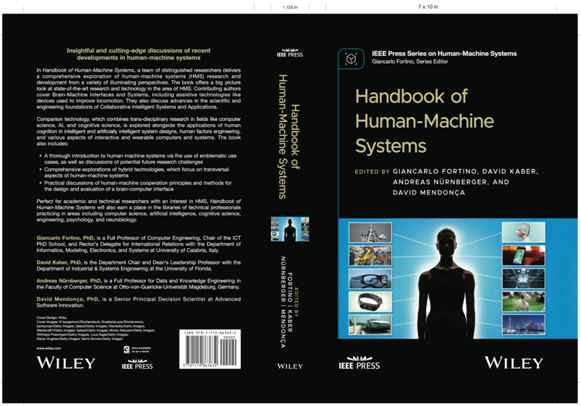The Handbook of Human-Machine Systems edited by Prof. Giancarlo Fortino from University of Calabria and leading guest editor, Prof. David Kaber from University of Florida, Prof. Andreas Nurberger from Otto-von-Guericke-Universität Magdeburg and Dr. David Mendonca from MITRE, provides insightful and cutting-edge state-of-the-arts and discussions of recent developments in human-machine systems (HMS).
The handbook is organized around the six main reference HMS research and technological areas and includes 37 chapters written by 118 researchers (from US, Canada, UK, Europe, China, Middle East and Australia), among which many of them are international references in the HMS area and, more specifically, in the HMS area of the SMC society. In fact, several HMS Technical Committees provided a chapter.
In particular, the HMS areas are:
- Brain-Machine Interfaces and Systems (BMIS): includes assistive technology and research allowing locked-in individuals to communicate and control exoskeletons/devices to improve locomotion.
- Collaborative Intelligent Systems and Applications (CISA): addresses advances on the development of scientific and engineering foundations, innovative technologies, and solutions for technology- and data-driven collaborative intelligent systems.
- Companion Technology (CT): covers and combines trans-disciplinary research in fields such as computer science and artificial intelligence, cognitive science, engineering, psychology, and neurobiology.
- Human-AI Interaction and Cognitive Computing & Engineering (HAICCE): encompasses human cognition in intelligent/AI system designs or/and development of AI algorithms, technology, methods for human beings.
- Human Factors Engineering (HFE): focuses on the advancements in theory and practice related to human interaction with intelligent agents in a wide variety of environments.
- Interactive and Wearable Computing and Systems (IWCS): focuses on advances and developments in all aspects of interactive and/or wearable computing and systems.
- Hybrid Technologies (HT): focuses on aspects that are transversal to the above six areas.
The handbook, which is endorsed by the IEEE SMC society, is published by IEEE Press/Wiley (see below its front and back covers) and available starting from end of July. Therefore, interested readers are warmly invited to ask their (research and industrial) institutions to provide them access to the handbook or to buy the book personally.



